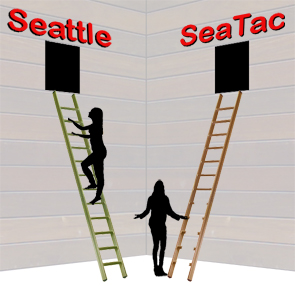Why do people work in a job? Not surprisingly, people have different answers to that simple question. That’s because a job is not only a place to earn an income, but also a place to earn credibility for a better job. Until a person retires each job can be a stepping-stone to the next. Indeed, interns work for little or no compensation in exchange for the education they receive. The stepping stone nature of internships is obvious, so why do so many people focus only on the wages?
The current radical protests for high minimum wages—that all jobs should be living wage jobs—ignores the fact that people take jobs for different reasons and thus are jeopardizing the ability of the poor and unskilled to accept entry-level jobs as stepping-stones to better ones. High minimum wages disqualify those people whose skills don’t match that wage. A common analogy is the ladder of success and that each job is another rung on the ladder. High minimum wages remove the bottom rungs from the ladder.
SeaTac has already sawn-off the bottom few rungs of the ladder to success, by pricing entry-level jobs out of the market. And now Seattle is considering this also. It will be especially harmful to the poor and unskilled.
So where did the irrational idea originate that all jobs should provide a living wage? It is rooted in Socialist and Communist fallacies that the value of a good can be determined by the amount of labor expended toward its production. This is called the Labor Theory of Value. To resolve the initial exchange of labor for goods Karl Marx suggested using labour vouchers based on hours worked. It didn’t matter whether the labor involved was mental or physical, skilled or unskilled, it was all equal and based on labor time. All jobs were equal.
In fact, the reasons why people take jobs are even more varied than explained above. Some people will take a job for the social interaction it provides, and would do so with or without compensation. Some highly skilled people choose non-profit work, even though they could command higher salaries elsewhere, because they value giving back to their community. Still others work for a period of time in different jobs to gain perspective, or as part of a research project. There are potentially thousands of different reasons why people accept jobs, besides earning a living wage.


Leave a Reply
You must be logged in to post a comment.